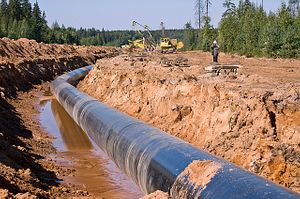Not that the Turkmenistan-Afghanistan-Pakistan-India (TAPI) pipeline needs any more delays, but Afghan officials say laws on land acquisition for the project as it crosses Afghanistan have not been signed, meaning the project’s timeline remains as foggy as ever.
According to a TOLO News report, the Afghan Ministry of Mines and Petroleum has said that some letters required for work to begin have not been signed yet.
“There is a need for the approval of the law (on land acquisition) but there are delays because the MPs are busy in (discussing) former decrees by the president. I think it will take six months to pass this phase,” the outlet quoted Ibrahim Jafarai, a member of the Natural Resources Monitoring Network, as saying.
Additionally, a comment attributed to a spokesman from the Afghan Ministry of Mines and Petroleum should draw attention: “We will sign four MoUs in the near future, and the host country’s (Turkmenistan’s) MoU is important. After that, the construction work of the project will begin in Afghanistan.”
In February 2018, representatives from Turkmenistan, Afghanistan, Pakistan, and India gathered in Herat to “inaugurate the arrival of [the] TAPI pipeline,” as Afghan President Ashraf Ghani tweeted at the time. At the inauguration, Ghani clasped hands with Turkmen President Gurbanguly Berdimuhamedov, then-Pakistani Prime Minister Shahid Khaqan Abbasi, and then-Indian Minister of State for External Affairs M.J. Akbar in a four-way handshake said to mark the start of work on the Afghan portion of the pipeline.
Starting, it appears, is a very long process.
The TAPI project, which has an estimated price tag of $8 to $10 billion, endeavors to bring 33 billion cubic meters of Turkmen gas to energy-starved South Asia for 30 years via a 1,800-kilometer pipeline that will stretch across Afghanistan. Construction had been estimated in the past to last two years, a laughable number considering the number of times Turkmenistan or the other partners along TAPI’s path have announced the “start” of one phase or another.
Or, for that matter, the completion of a phase.
In the January issue of The Diplomat Magazine, I penned an update on TAPI, sparked by a December 2019 press release out out by Italian energy consultant RINA that it had been contracted by Turkmengaz, the state energy company, to serve “as its technical consultant for supervision and project support services relating to the Turkmen section of the TAPI gas pipeline.”
The $13 million contract, RINA said in its press release, “covers technical advice and support services for the construction of a 214 km of pipeline across Turkmenistan along with two compressor stations.” Work will be carried out in two phases over four years.
Funny, as back in February 2018, as the officials were shaking hands in herat, Muhammetmyrad Amanov, the CEO of the TAPI Pipeline Company told Euronews: “We have concluded our work in Turkmenistan and we now move to Afghanistan. We plan to finish the job and put gas in the pipeline towards the end of 2019.”
RFE/RL’s Bruce Pannier has been hard on the TAPI-watch beat, noting in an April 2019 report that a Russian plant won a contract to supply pipe to Turkmenistan, following a report the previous November that a Saudi Arabian pipe company had begun delivering pipes for TAPI. Pannier wrote on December 1, “From the early years after Turkmenistan’s independence in 1991, officials there, beginning with the president at the time, have been prone to offering optimistic or flattering appraisals of the country’s achievements. Later evidence showed some of these claims were exaggerated or just plain false.”
On December 4, RINA’s press release announcing it had been hired to assist Turkmenistan dropped.
Ultimately, outside observers have very little concrete information about the progress of TAPI. Afghan media in the past two years have run numerous reports on “delays,” while Pakistani papers post more positive stories, such as this from The Nation this month declaring, “TAPI gas pipeline project advancing as per timelines.”
One issue is that the details are far from public view. Afghan officials, even back in 2018, seem to be more candid in noting, for example, that they needed to do assessments and land acquisition before construction could begin. But their offered timelines still come and go. Afghanistan isn’t even past the land acquisition hurdle as of January 2020, blowing past statements made in 2018 that the project would be completed by 2019.
Beyond the other often-cited issues — namely, security — is the matter of politics. If Afghan MPs are busy discussing previous decrees, it could be some time before they get to an issue as touchy but critical as land acquisition for a pipeline hoped to bring in $400 million in annual transit revenue alongside much-needed energy resources.
































